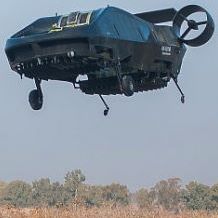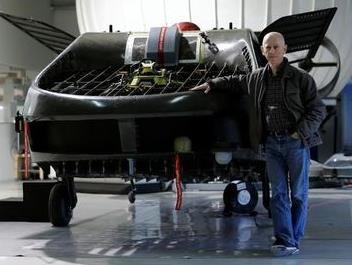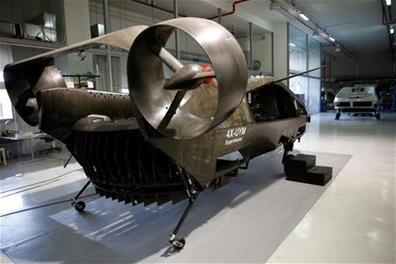
Featured Item

Israel’s ‘flying car’ one step closer to delivery
ANT KATZ
Back to the future…
The Cormorant, billed as a flying car, can transport 500kg and travel at 185 km/hr and has completed its first solo flight. Developer Urban Aeronautics believes the dark green drone, which uses internal rotors rather than helicopter propellers, could evacuate people from hostile environments and/or allow military forces safe access.
 “Just imagine a dirty bomb in a city and chemical substance of something else and this vehicle can come in robotically, remotely piloted, come into a street and decontaminate an area,”
“Just imagine a dirty bomb in a city and chemical substance of something else and this vehicle can come in robotically, remotely piloted, come into a street and decontaminate an area,”
RIGHT: Rafi Yoeli, Urban Aeronautics’ founder & CEO, with a Cormorant prototype (REUTERS/Amir Cohen)
Yoeli told Reuters at the company’s workshop in Yavne, that The Cormorant flying car’s total development price to date is estimated at R192 million (at today’s exchange rate).
The company is based in a large hanger in Yavne, central Israel. It was established in 2001 to create the drone, which Yoeli says is safer than a helicopter as it can fly in between buildings and below power lines without the risk of blade strikes.

LEFT: the back end of a prototype Cormorant pictured at Urban Aeronautics’ workshop last month. (REUTERS/Amir Cohen)
However, the company accedes, there is still plenty of work required before this autonomous vehicle is ready for market.
The Cormorant is more or less the size of a family car and was originally called the ‘Air Mule’. It is yet to meet all US Federal Aviation Administration standards and, during its first test flight, saw small issues with conflicting data sent by on-board sensors.
With 39 patents registered to create the vehicle, Yoeli has little concern about competitors usurping him.
One industry pundit said the technology could save lives.
“It could revolutionise several aspects of warfare, including medical evacuation of soldiers on the battlefield,” said Tal Inbar, head of the UAV research centre at Israel’s Fisher Institute for Air and Space Strategic Studies.





nat cheiman
January 9, 2017 at 7:14 pm
‘This will be a boon to taxis in SA’